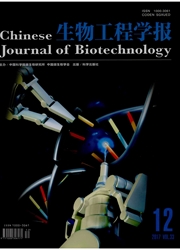

 中文摘要:
中文摘要:
最小生命体的合成是合成生物学研究的重要方向。最小化基因组的同时而又不对细胞生长产生影响是代谢工程研究的一个重要目标。文中提出了一种从基因组尺度代谢网络模型出发,通过零通量反应删除及对非必需基因组合删除计算获得基因组最小化代谢网络模型的方法,利用该方法简化了大肠杆菌经典代谢网络模型iAF1260,由起始的1 260个基因简化得到了312个基因,而最优生物质生成速率保持不变。基因组最小化代谢网络模型预测了在细胞正常生长的前提下包含最少基因的代谢途径,为大肠杆菌获得最小基因组的湿实验设计提供了重要参考。
 英文摘要:
英文摘要:
The minimum life is one of the most important research topics in synthetic biology.Minimizing a genome while at the same time maintaining an optimal growth of the cells is one of the important research objectives in metabolic engineering.Here we propose a genome minimization method based on genome scale metabolic network analysis.The metabolic network is minimized by first deleting the zero flux reactions from flux variability analysis,and then by repeatedly calculating the optimal growth rates after combinatorial deletion of the non-essential genes in the reduced network.We applied this method to the classic E.coli metabolic network model---iAF1260 and successfully reduced the number of genes in the model from 1 260 to 312 while maintaining the optimal growth rate unaffected.We also analyzed the metabolic pathways in the network with the minimized number of genes.The results provide some guidance for the design of wet experiments to obtain an E.coli minimal genome.
 同期刊论文项目
同期刊论文项目
 同项目期刊论文
同项目期刊论文
 A Semi-Markov Model for Mitosis Segmentation in Time-Lapse Phase Contrast Microscopy Image Sequences
A Semi-Markov Model for Mitosis Segmentation in Time-Lapse Phase Contrast Microscopy Image Sequences Engineering Escherichia coli for succinate production from hemicellulose via consolidated bioprocess
Engineering Escherichia coli for succinate production from hemicellulose via consolidated bioprocess Aerobic production of succinate from arabinose by metabolically engineered Corynebacterium glutamicu
Aerobic production of succinate from arabinose by metabolically engineered Corynebacterium glutamicu Directed pathway evolution of the glyoxylate shunt in Escherichia coli for improved aerobic succinat
Directed pathway evolution of the glyoxylate shunt in Escherichia coli for improved aerobic succinat Engineering microorganisms based on molecular evolutionary analysis: a succinate production case stu
Engineering microorganisms based on molecular evolutionary analysis: a succinate production case stu Engineering of Acetate Recycling and Citrate Synthase to Improve Aerobic Succinate Production in Cor
Engineering of Acetate Recycling and Citrate Synthase to Improve Aerobic Succinate Production in Cor Metabolic engineering of Escherichia coli and in silico comparing of carboxylation pathways for high
Metabolic engineering of Escherichia coli and in silico comparing of carboxylation pathways for high Establishment of a Markerless Mutation Delivery System in Bacillus subtilis Stimulated by a Double-S
Establishment of a Markerless Mutation Delivery System in Bacillus subtilis Stimulated by a Double-S NADH plays the vital role for chiral pure D-(-)-2,3-butanediol production in Bacillus subtilis under
NADH plays the vital role for chiral pure D-(-)-2,3-butanediol production in Bacillus subtilis under Inverse metabolic engineering of Bacillus subtilis for xylose utilization based on adaptive evolutio
Inverse metabolic engineering of Bacillus subtilis for xylose utilization based on adaptive evolutio Improved succinate production in Corynebacterium glutamicum by engineering glyoxylate pathway and su
Improved succinate production in Corynebacterium glutamicum by engineering glyoxylate pathway and su 期刊信息
期刊信息
